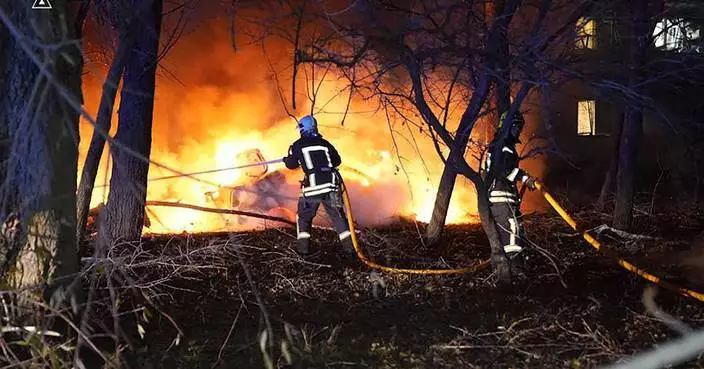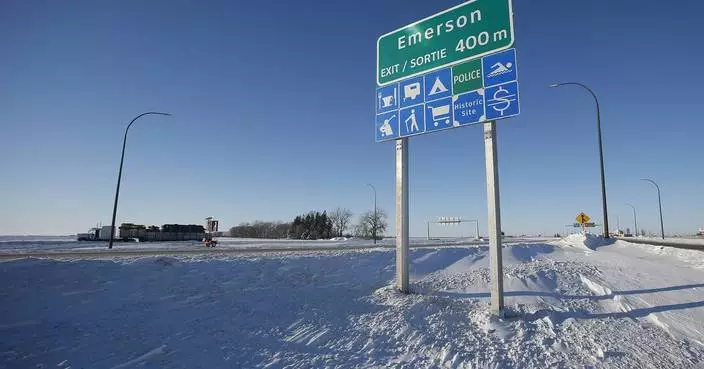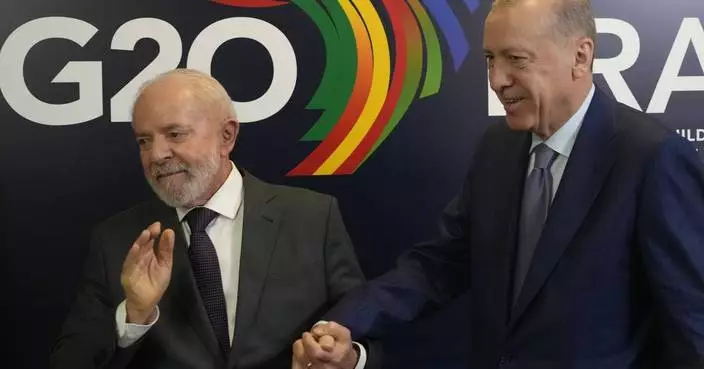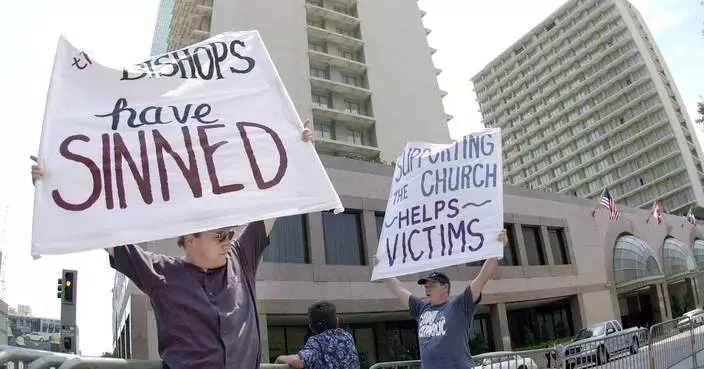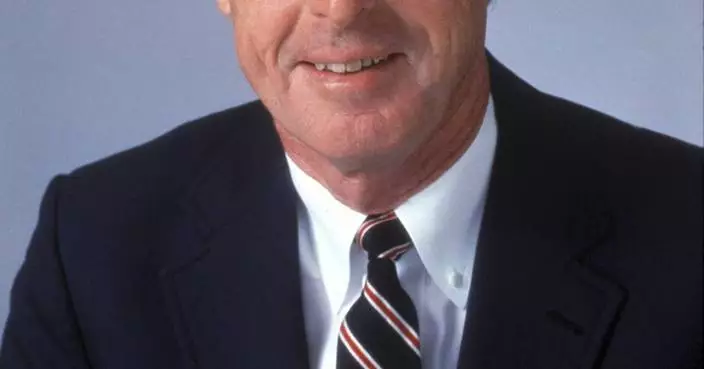Just days after announcing a civil fine against Ford for moving too slowly on a recall, the U.S. government unveiled two investigations into recalls that may not have worked or covered enough vehicles.
The largest of the probes covers about 457,000 Ford Bronco Sport SUVs and Maverick small pickups. In April Ford recalled certain 2021 through 2024 Bronco Sports and 2022 through 2023 Mavericks were recalled because they can suddenly lose power.
There have been five complaints from owners whose vehicles lost power after getting the recall fix, the National Highway Traffic Safety Administration said in a document posted Monday. The agency will investigate whether the recall was effective. The power loss has been blamed on degraded 12-volt batteries.
The other probe covers about 113,000 Ford Expeditions from 2019 through 2020. Ford recalled about 78,000 of the SUVs in February because the driver and front passenger seat belts can tighten up and hold people with no crash apparent.
The agency says it has complaints about the problem occurring from three owners whose vehicles were not part of the recall. Investigators will check to see if the recall should be expanded.
Ford said it's cooperating in both investigations.
On Thursday NHTSA announced that Ford Motor Co. will pay a penalty of up to $165 million for moving too slowly on a recall and failing to give the agency accurate recall information.
The agency said the civil penalty is the second-largest in its 54-year history. Only the fine Takata paid for faulty air bag inflators was higher.
NHTSA said Ford was too slow to recall vehicles with faulty rearview cameras, and it failed to give the agency complete information, which is required by the Federal Motor Vehicle Safety Act.

FILE - The Ford logo is seen on the grill of a Ford Explorer on display at the Pittsburgh International Auto Show in Pittsburgh, on Feb. 15, 2024. (AP Photo/Gene J. Puskar, File)
Israeli strikes in the Gaza Strip killed eight people, including two children aged 7 and 9 and their parents, Palestinian officials said Monday.
A third child, 10 years old, was wounded in an overnight strike on a tent where displaced people were sheltering in the southern city of Khan Younis, according to the Civil Defense, first responders who operate under the Hamas-run government. An Associated Press reporter saw the children's bodies at nearby Nasser Hospital.
A separate strike early Monday killed four people, including a woman and a child, in the built-up Nuseirat refugee camp, according to nearby Al-Aqsa Martyrs Hospital.
The Israeli military blames civilian deaths on Hamas, accusing militants of hiding among civilians and fighting from residential areas. It rarely comments on individual strikes, which often kill women and children.
The war began when Hamas stormed into Israel on Oct. 7, 2023, killing some 1,200 people, mostly civilians, and abducting around 250. Some 100 hostages are still inside Gaza, a third of whom are believed to be dead.
Israel’s retaliatory offensive has killed over 43,800 Palestinians, according to local health authorities. They do not distinguish between militants and civilians but say most of those killed are women and children. The fighting has left some 76 people dead in Israel, including 31 soldiers.
Here's the Latest:
GENEVA — The head of the U.N. agency for Palestinian refugees says Israel would have the “responsibility” to respond to their needs if it goes through with plans to ban the agency.
Philippe Lazzarini, the commissioner-general of UNRWA, on Monday stepped up appeals to the international community to help convince Israeli authorities not to go through with the ban.
Measures passed by the Knesset, if carried out as anticipated in January, would ban UNRWA from operating and cut all ties between the agency and the Israeli government.
“The clock is ticking,” Lazzarini told reporters in Geneva.
Critics say the Knesset moves culminated a long-running campaign against UNRWA, which Israel contends has been infiltrated by Hamas. They say Israel’s real aim is to sideline the issue of Palestinian refugees.
Lazzarini all but suggested that the considerable work helping Palestinian refugees would then fall to Israel under international law.
“I keep being asked, Is there yes, or not, a Plan B? There is no plan B within the U.N. agency -- within the U.N. family because there is no other agency geared to provide the same activities,” he said.
“UNRWA is the response of the international community to the plight of the Palestinian refugees, through the mandate provided by the GA (United Nations General Assembly) resolution,” Lazzarini added. “So, if there is no U.N. or international community response, the responsibility will go back to the occupying power, being Israel.”
“And that’s where we have to ask: Where does a plan B sit today?” he said.
TEL AVIV, Israel — The Israeli military said Monday it had delivered fuel and medical equipment to hospitals in a besieged part of northern Gaza, where troops have launched an intense operation since October.
COGAT, the Israeli military body in charge of humanitarian aid to Gaza said, said they delivered 10,000 liters of fuel and 149 packages of medical equipment to two hospitals, and helped oversee the evacuation of 64 patients and their escorts, along with the U.N., from hard-hit hospitals in the north.
The hospitals that serve the area have been largely inaccessible because of the fighting, and a raid on Kamal Adwan Hospital last month left it barely functional.
Israel has faced international pressure to improve the humanitarian situation in Gaza, particularly in the war-ravaged north. Last week, the United States said it would not limit arms transfers to Israel as it had threatened to do in October if aid was not significantly stepped up.
In November, COGAT said they facilitated at least two aid deliveries to the far north, after a month in which virtually no supplies reached these areas. But international aid groups warned much more is needed, and famine is imminent in parts of northern Gaza.
BEIRUT — A funeral was held Monday in southern Lebanon for Mohammad Afif, Hezbollah’s head of media relations, a day after he was killed in an Israeli airstrike in central Beirut.
Afif’s coffin, draped in Hezbollah’s yellow flag, was carried through the streets of Sidon on the shoulders of mourners.
“Resistance is the response, and the convoys of martyrs create victory," Afif’s brother, Sadiq al-Naboulsi, said at the funeral.
"Hajj Mohammad Afif was a big figure in the media, and therefore the Israelis and Americans were hurt by his voice. For that reason, they assassinated him. The killing of Hajj Mohammad Afif and all the martyrs and leaders will not turn (us) back at all,” he said.
The strike that hit central Beirut for the first time in over a month also killed three other people on Sunday, according to Lebanon’s Health Ministry.
Afif had been a prominent spokesperson for Hezbollah, especially during the recent escalation of tensions with Israel. Days before his death, he held a press conference in Beirut’s southern suburbs, where he declared that Hezbollah was prepared for a prolonged war and denied claims that the group had lost its missile capabilities.
BEIRUT — A government minister close to Hezbollah says Lebanon will convey its “positive position” on a United States-backed cease-fire proposal this week.
The Biden administration is trying to halt the war between Israel and the militant group after months of sputtering cease-fire efforts.
Lebanon’s Parliament Speaker Nabih Berri, a Hezbollah ally who is mediating for the militants, is expected to meet with U.S. envoy Amos Hochstein in the Lebanese capital on Tuesday.
Labor Minister Mostafa Bayram, who met with Berri on Monday, said Hezbollah’s function “is to make sure the (Israeli) aggression fails to achieve its goals, while negotiation is for the state and the government.”
A Western diplomat familiar with the talks told The Associated Press there is a sense of “cautious optimism.”
“Diplomatic efforts are converging towards a cease-fire, but it’s still in the hands and heads of key players to decide if it’s in their interest or not to stop things right now,” said the diplomat, who was not authorized to brief media and so spoke on condition of anonymity.
The efforts are aimed at reestablishing a U.N. buffer zone in southern Lebanon established after the 2006 Israel-Hezbollah war. Israel is said to be pushing for guarantees it can continue to act militarily against Hezbollah if needed, a demand the Lebanese are unlikely to accept.
— By Kareem Chehayeb
ANKARA, Turkey — Turkey has denied Israeli President Isaac Herzog’s plane the right to use its airspace, preventing him from traveling to Azerbaijan, the Turkish state-run news agency reported.
The Anadolu Agency report late Sunday said Israeli authorities requested permission for the plane to access the Turkish airspace on its way to Baku, Azerbaijan, where Herzog was scheduled to attend the COP29 conference on climate change.
The agency based its report on unnamed Turkish officials. It did not say when the permission was denied. A statement from Herzog's office said the decision to cancel the president's trip to Baku was due to “the situation assessment and for security reasons." It did not comment on the Turkish report.
Turkey has emerged as one of the strongest critics of Israel’s military actions in Gaza and Lebanon. It has suspended trade relations with Israel, accused the country of genocide and voiced support to Hamas.
KHAN YOUNIS, Gaza Strip — Israeli strikes on the Gaza Strip have killed eight people, including two children aged 7 and 9 and their parents, Palestinian officials said. A third child, 10 years old, was wounded in the same strike.
The Civil Defense, first responders who operate under the Hamas-run government, said Monday that the two children were killed in an overnight strike on a tent where displaced people were sheltering in the southern city of Khan Younis.
An Associated Press reporter saw the bodies at nearby Nasser Hospital. The two children were beheaded by the blast and their remains were placed in one body bag.
A separate strike early Monday killed four people, including a woman and a child, in the built-up Nuseirat refugee camp, according to nearby Al-Aqsa Martyrs Hospital.
The Israeli military blames civilian deaths on Hamas, accusing militants of hiding among civilians and fighting from residential areas. It rarely comments on individual strikes, which often kill women and children.
The war began when Hamas stormed into Israel on Oct. 7, 2023, killing some 1,200 people, mostly civilians, and abducting around 250. Some 100 hostages are still inside Gaza, a third of whom are believed to be dead.
Israel’s retaliatory offensive has killed over 43,800 Palestinians, according to local health authorities. They do not distinguish between militants and civilians but say most of those killed are women and children.
For more Middle East news: https://apnews.com/hub/middle-east
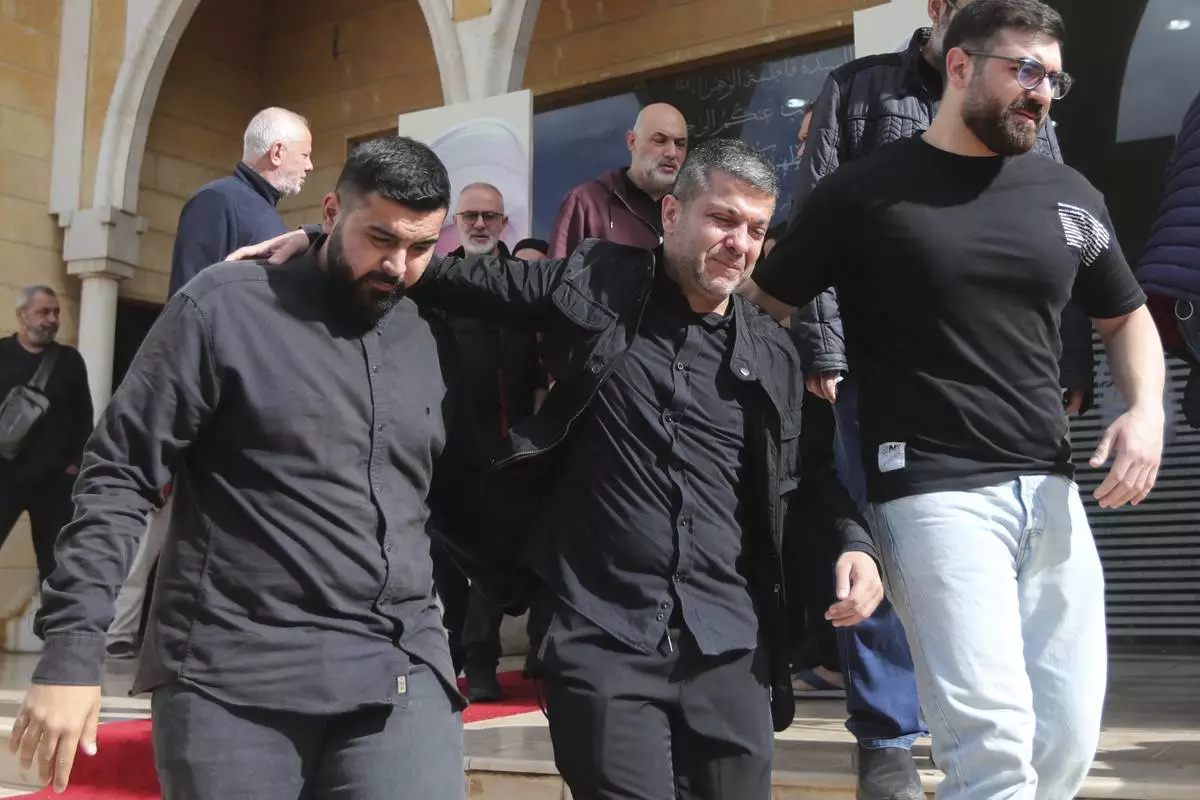
The brother of Hezbollah's chief spokesman Mohammed Afif, center, killed in an Israeli airstrike in Beirut on Sunday, mourns during his funeral in the southern port city of Sidon, Lebanon, Monday, Nov. 18, 2024. (AP Photo/Mohammed Zaatari)
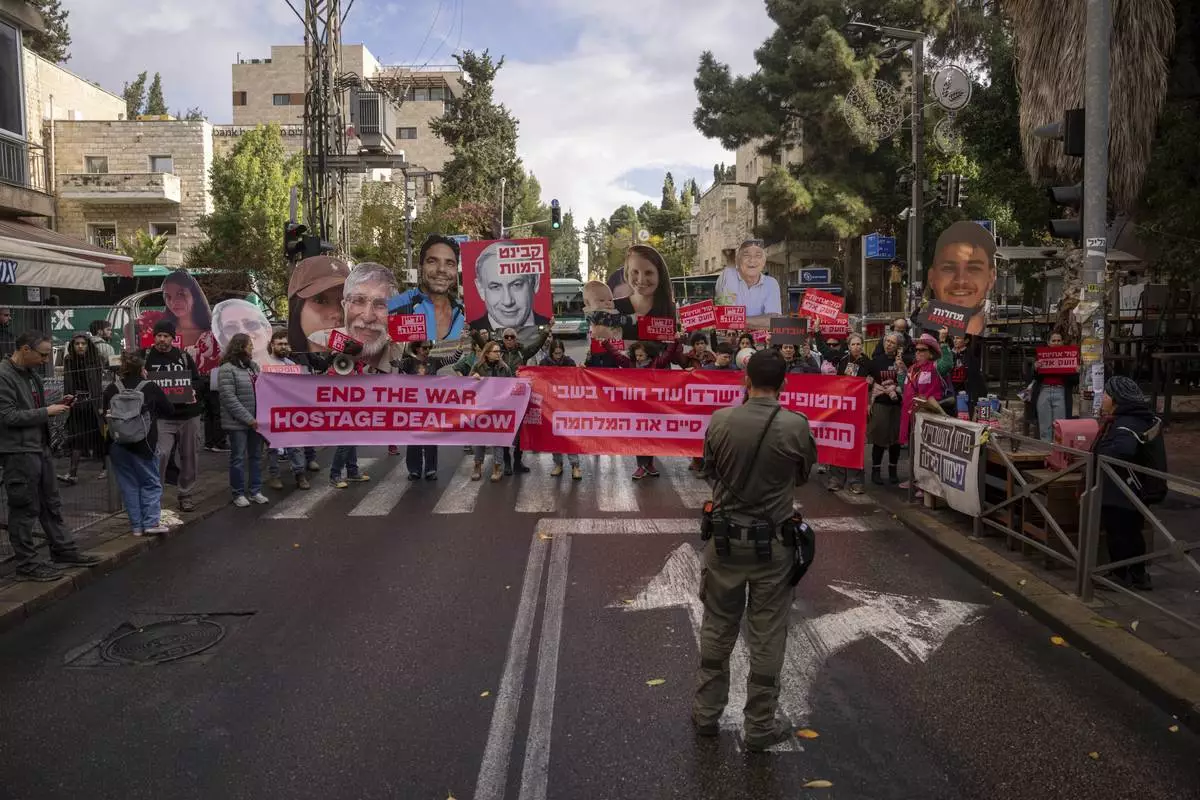
Families and supporters of Israeli hostages held by Hamas in Gaza, hold photos of their loved ones during a protest calling for their release outside the prime minister's house in Jerusalem, Monday, Nov. 18, 2024. (AP Photo/Ohad Zwigenberg)
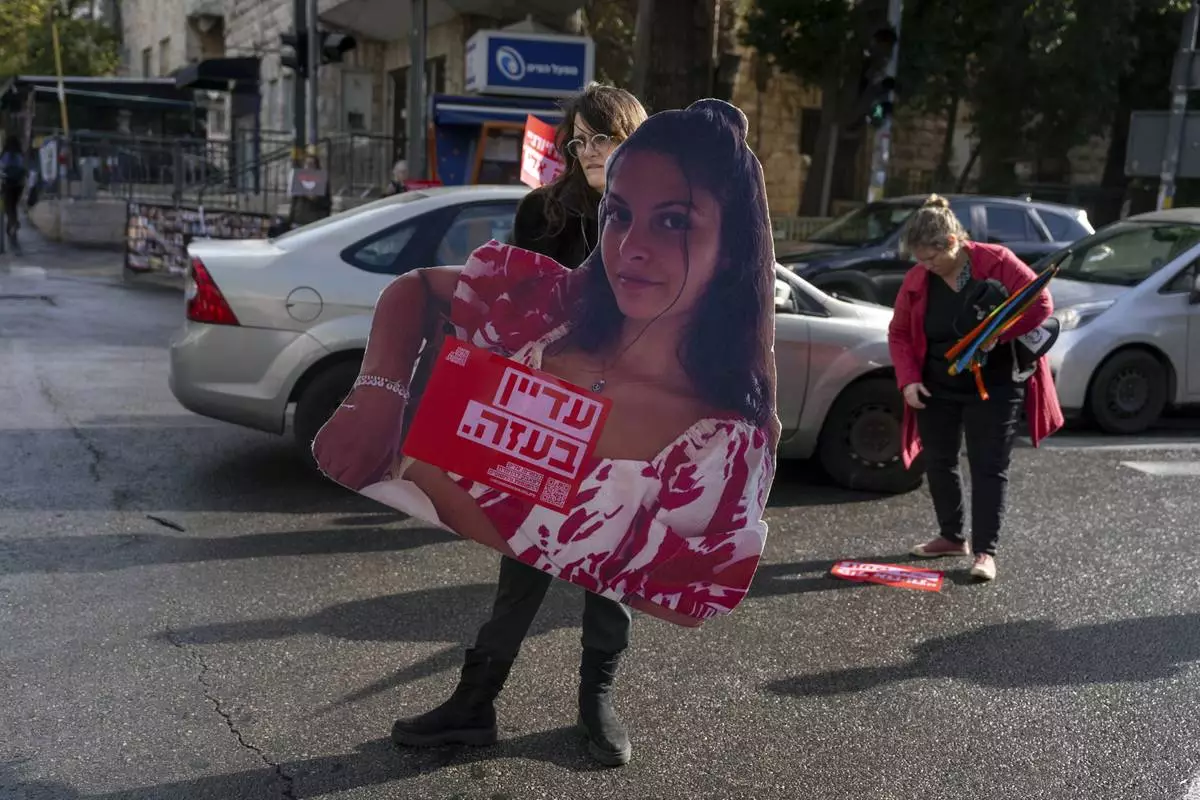
A supporter of Israeli hostages held by Hamas in Gaza, holds a placard showing a loved one with writing: "still in Gaza," during a protest calling for their release outside the prime minister's house in Jerusalem, Monday, Nov. 18, 2024. (AP Photo/Ohad Zwigenberg)
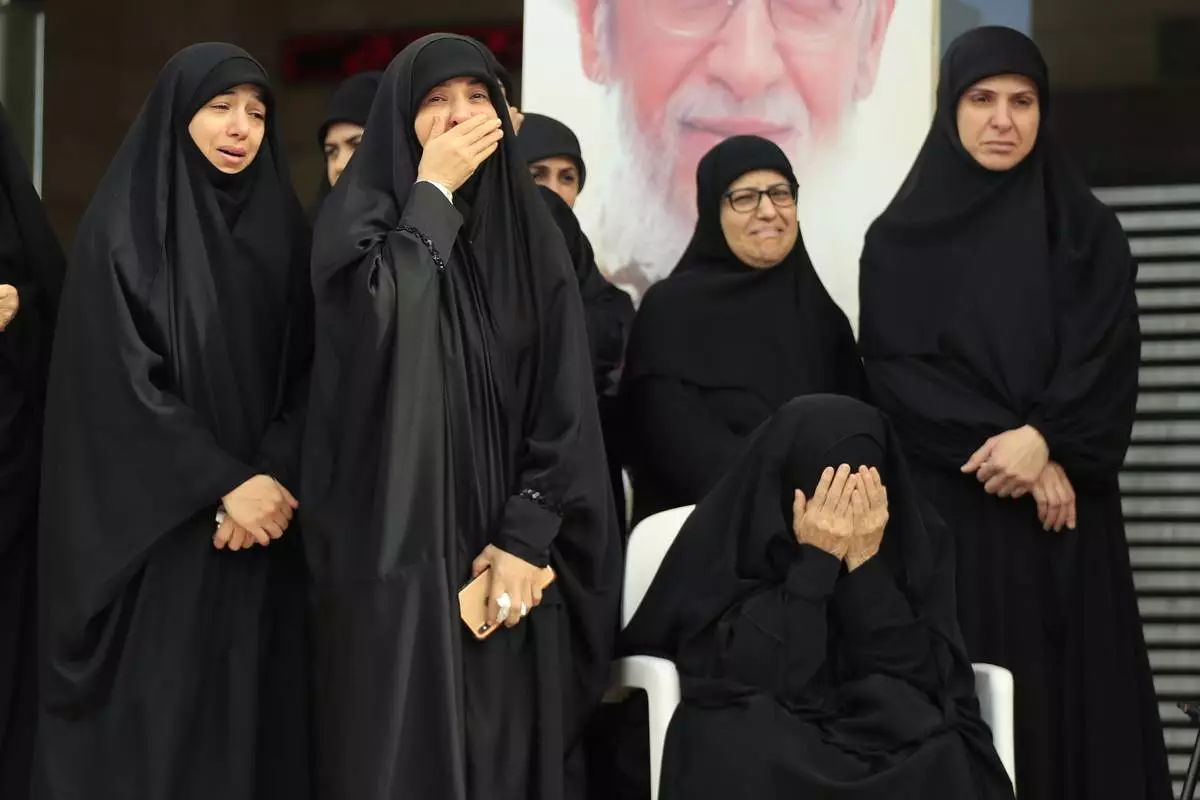
Relatives of Hezbollah's chief spokesman Mohammed Afif who was killed in an Israeli airstrike in Beirut on Sunday, mourn during his funeral in the southern port city of Sidon, Lebanon, Monday, Nov. 18, 2024. (AP Photo/Mohammed Zaatari)
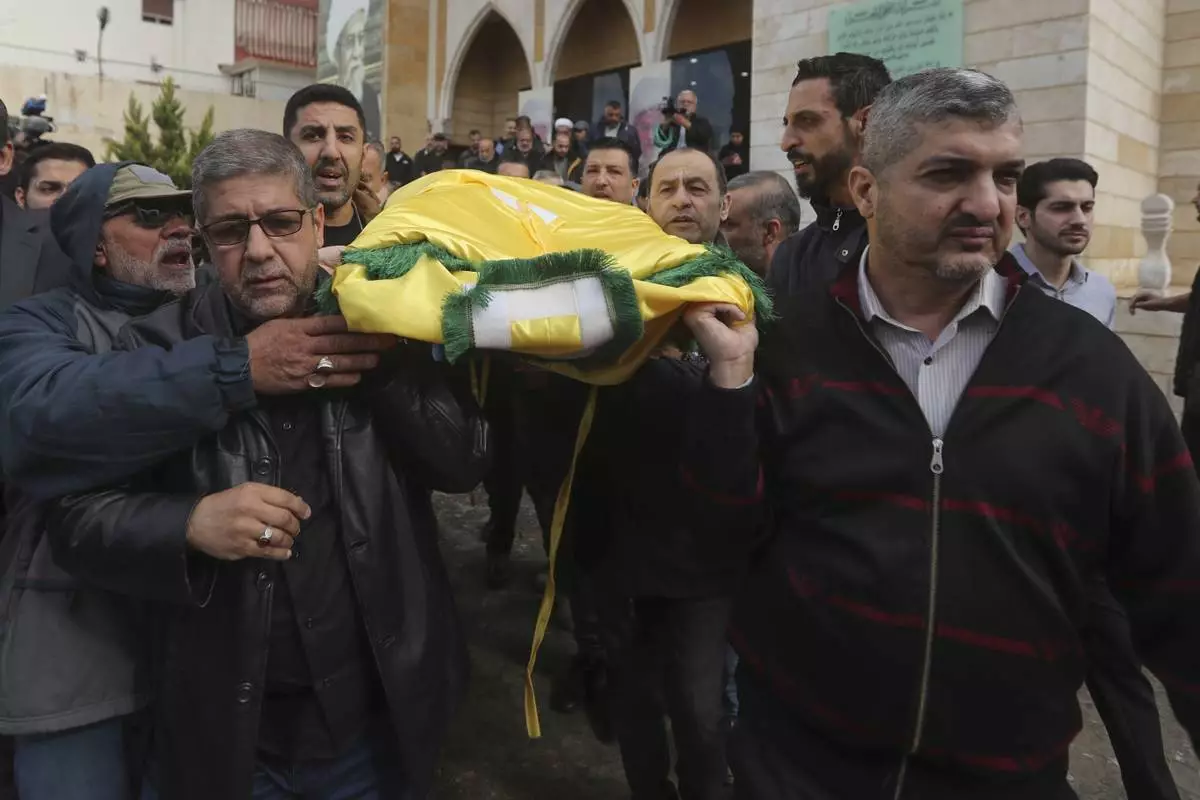
Mourners and relatives of Hezbollah's chief spokesman Mohammed Afif who was killed in an Israeli airstrike in Beirut on Sunday, carry his body during his funeral in the southern port city of Sidon, Lebanon, Monday, Nov. 18, 2024. (AP Photo/Mohammed Zaatari)
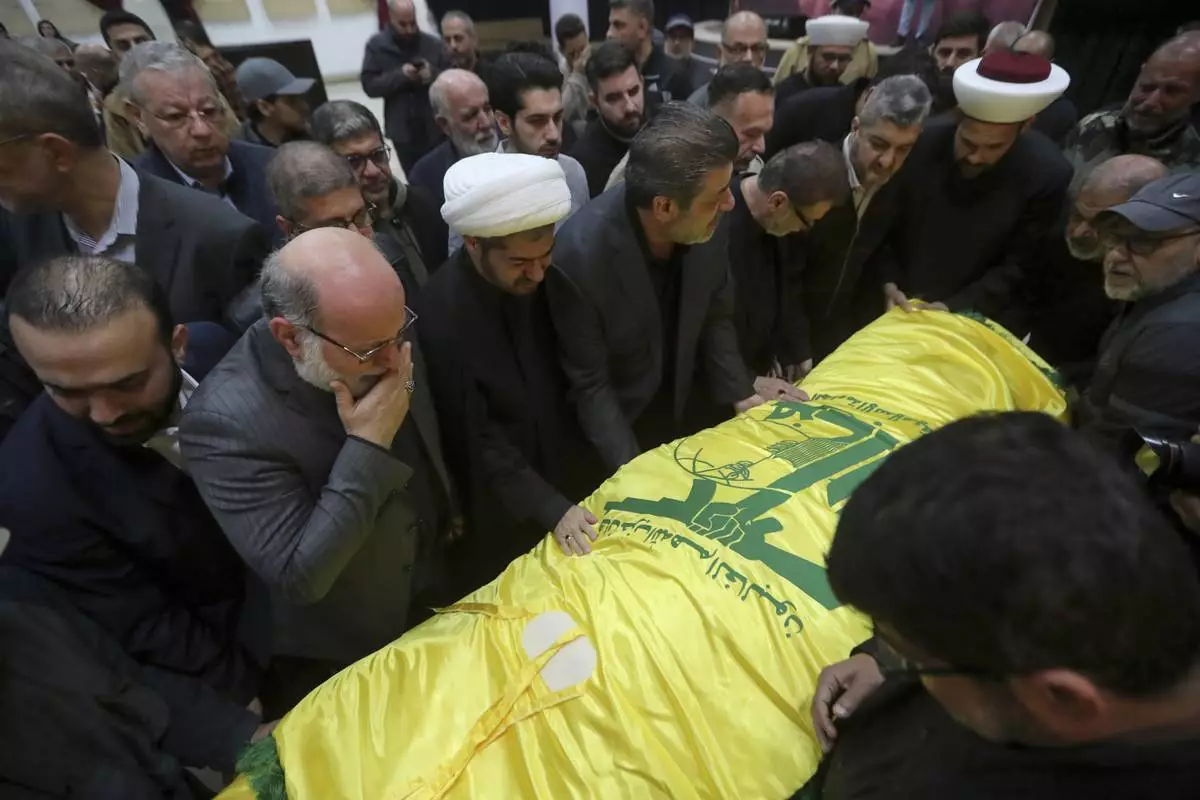
Mourners and relatives of Hezbollah's chief spokesman Mohammed Afif, killed in an Israeli airstrike in Beirut on Sunday, mourn over his body wrapped in a Hezbollah flag, during his funeral in the southern port city of Sidon, Lebanon, Monday, Nov. 18, 2024. (AP Photo/Mohammed Zaatari)
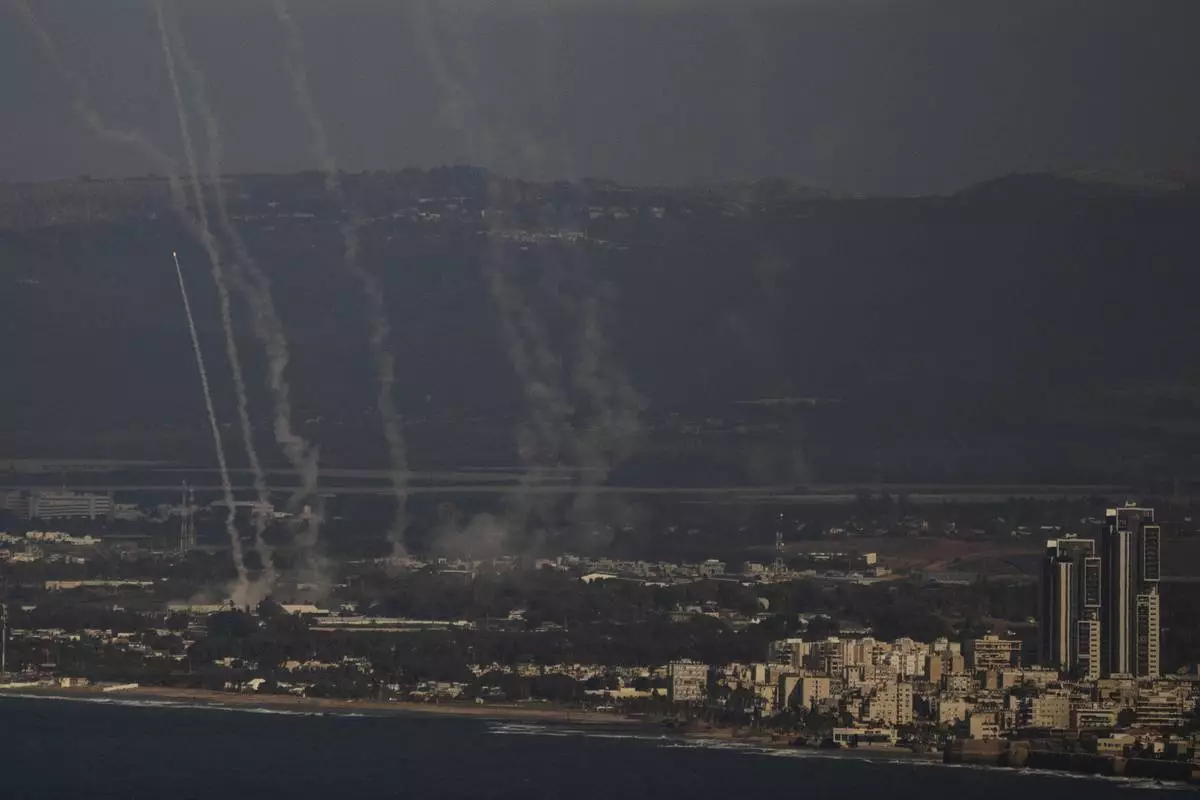
Israel’s Iron Dome missile defense system fires to intercept rockets that were launched from Lebanon, as seen from Haifa, northern Israel, Monday, Nov. 18, 2024. (AP Photo/Leo Correa)
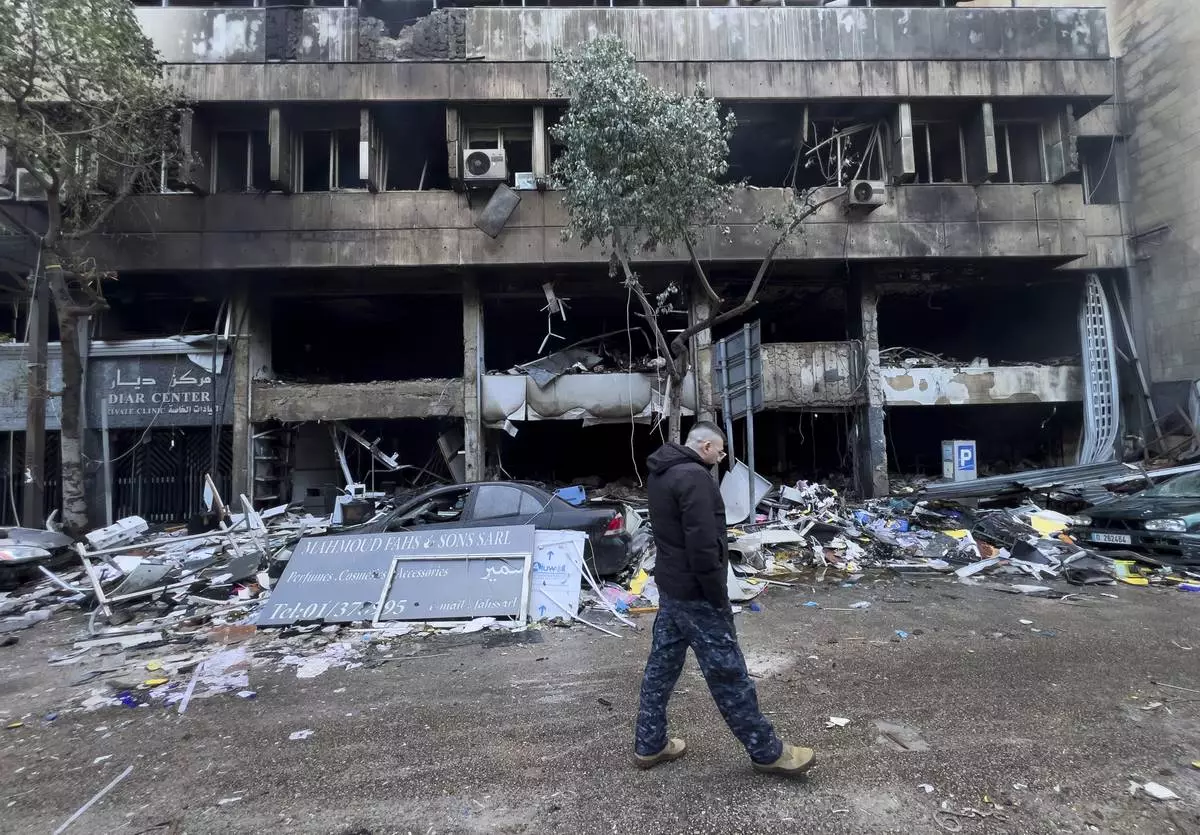
A Lebanese policeman walks in front of destroyed shops that were hit Sunday evening by an Israeli airstrike in central Beirut, Lebanon, Monday, Nov. 18, 2024. (AP Photo/Hussein Malla)
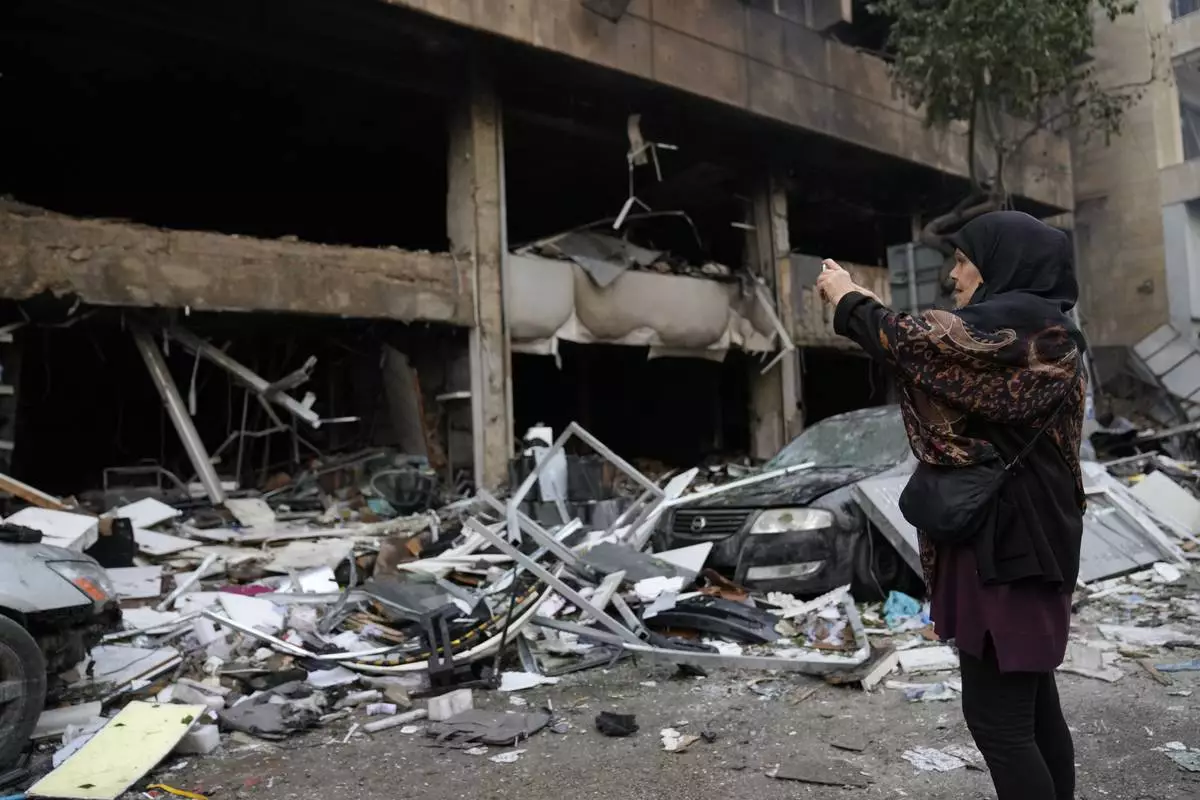
A woman uses her phone to record destroyed shops that were hit Sunday evening by an Israeli airstrike in central Beirut, Lebanon, Monday, Nov. 18, 2024. (AP Photo/Hussein Malla)
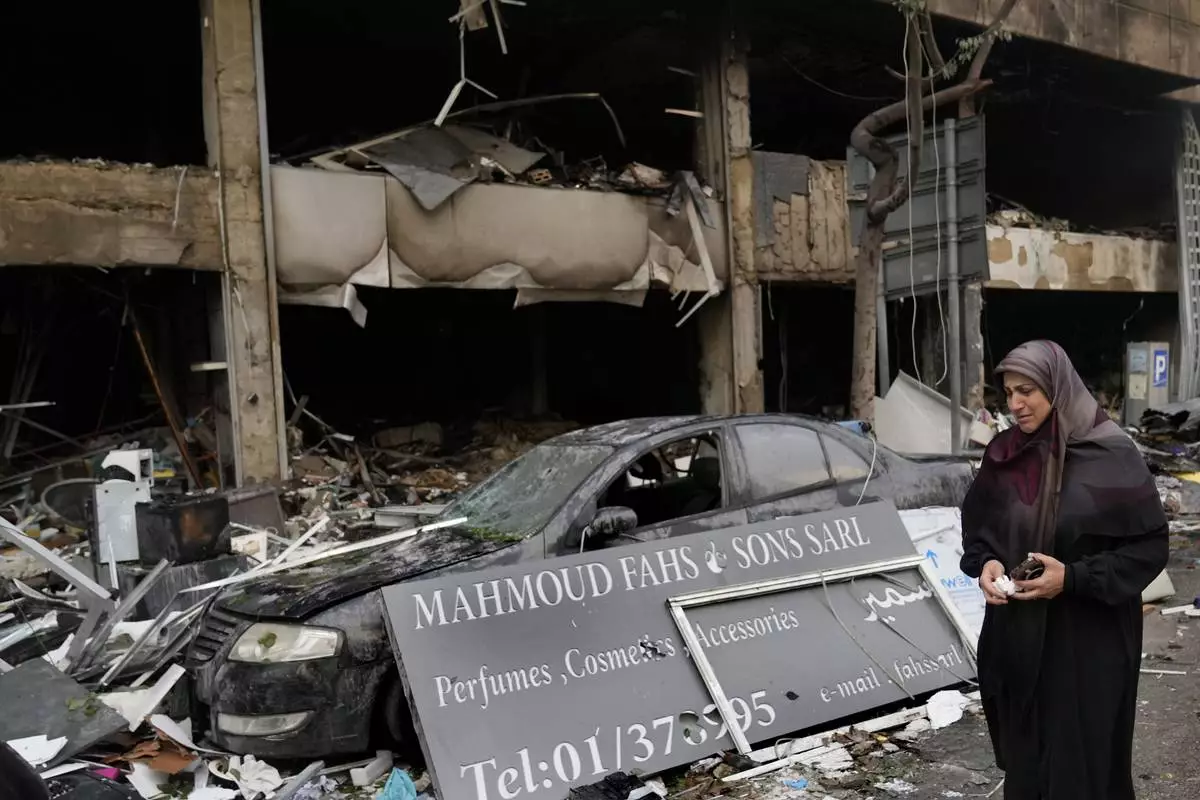
A woman weeps as she passes in front of destroyed shops that were hit Sunday evening in an Israeli airstrike in central Beirut, Lebanon, Monday, Nov. 18, 2024. (AP Photo/Hussein Malla)
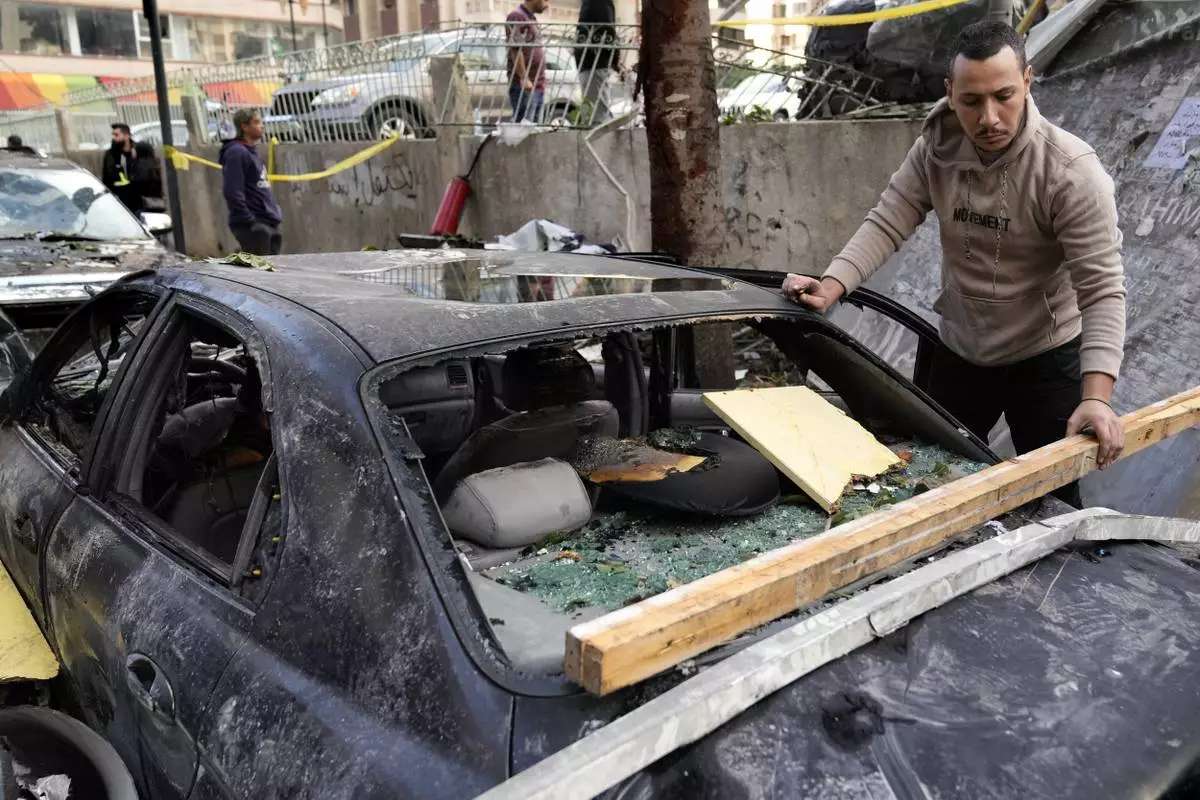
A man removes debris from his damaged car at the site where an Israeli airstrike on Sunday evening hit in central Beirut, Lebanon, Monday, Nov. 18, 2024. (AP Photo/Hussein Malla)
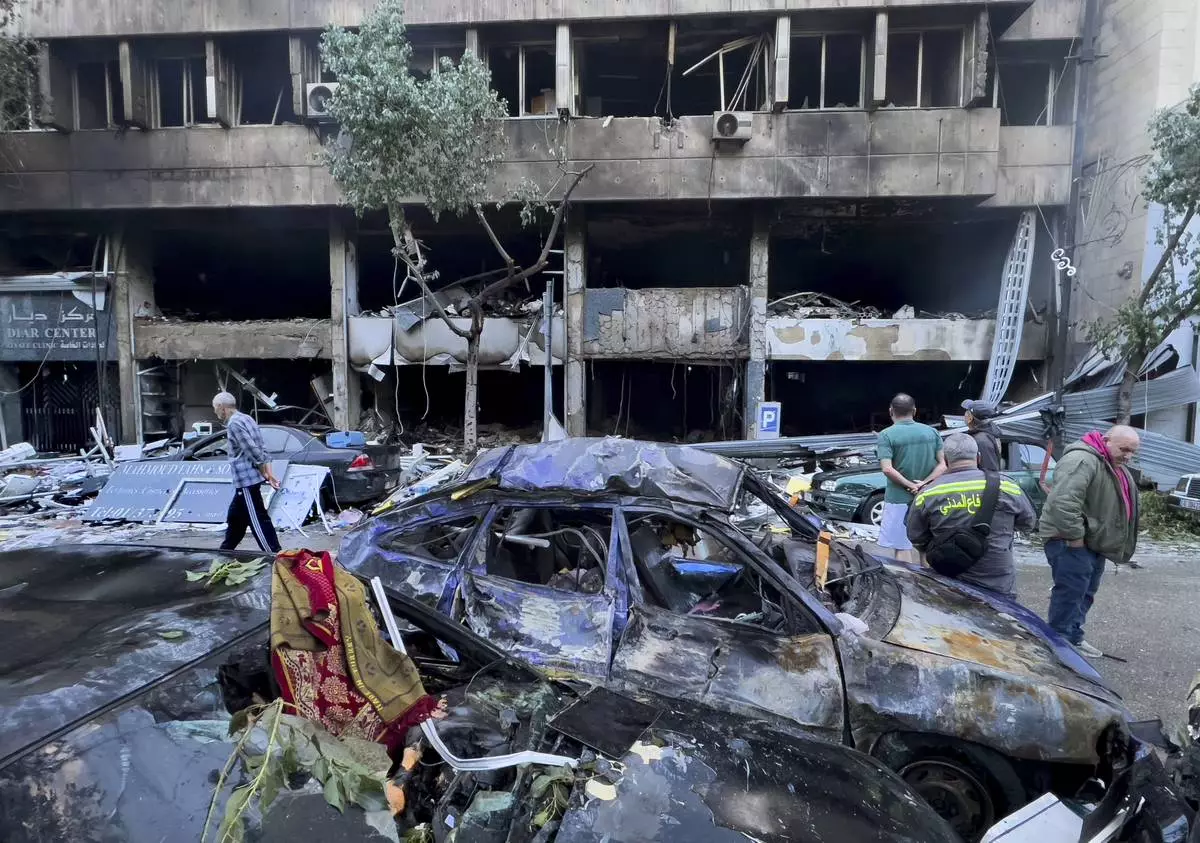
People gather in front of destroyed shops that were hit Sunday evening in an Israeli airstrike in central Beirut, Lebanon, Monday, Nov. 18, 2024. (AP Photo/Hussein Malla)
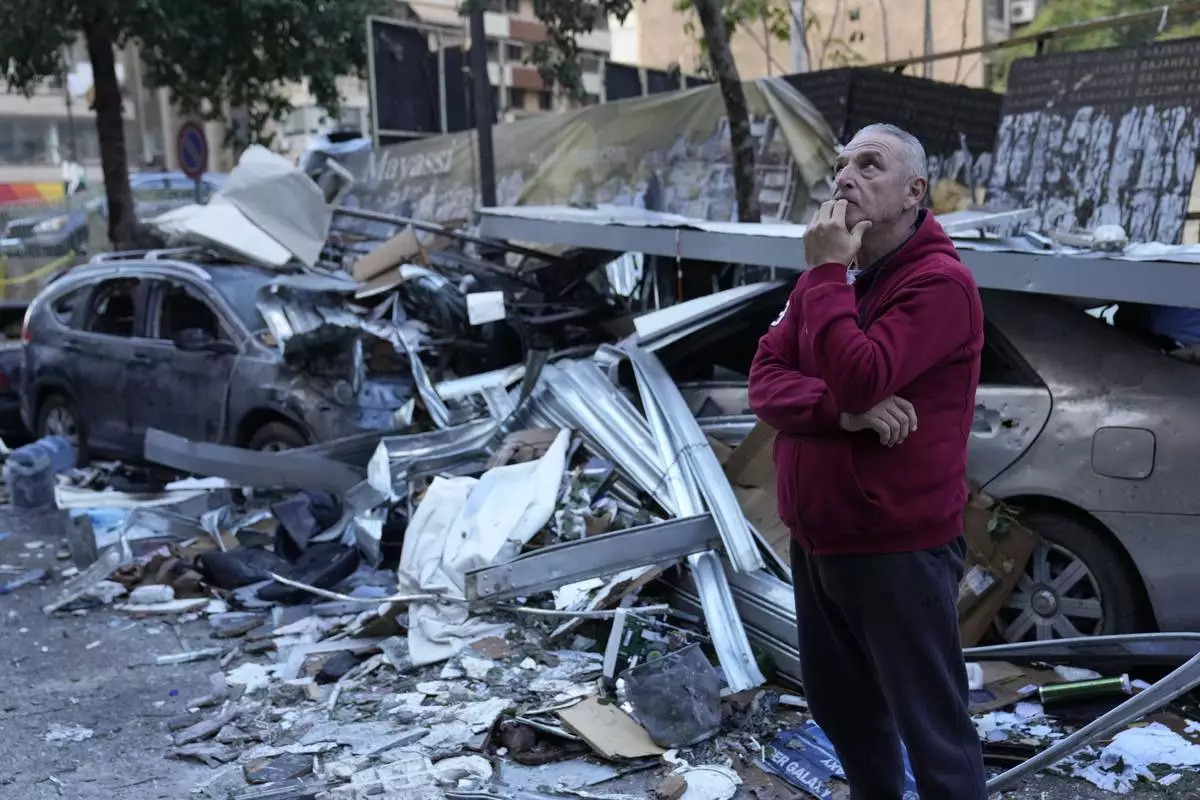
A man watches the damage at the site where an Israeli airstrike Sunday evening hit in central Beirut, Lebanon, Monday, Nov. 18, 2024. (AP Photo/Hussein Malla)


















